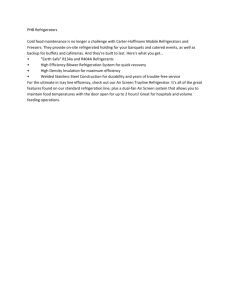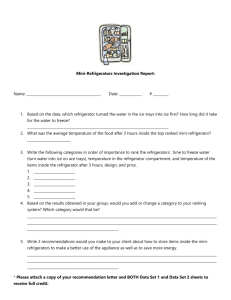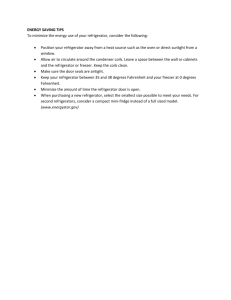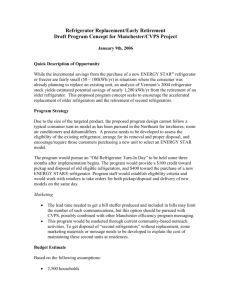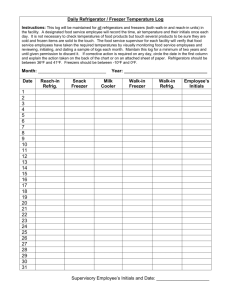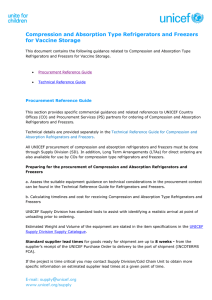Care of Refrigerators and Freezers
advertisement
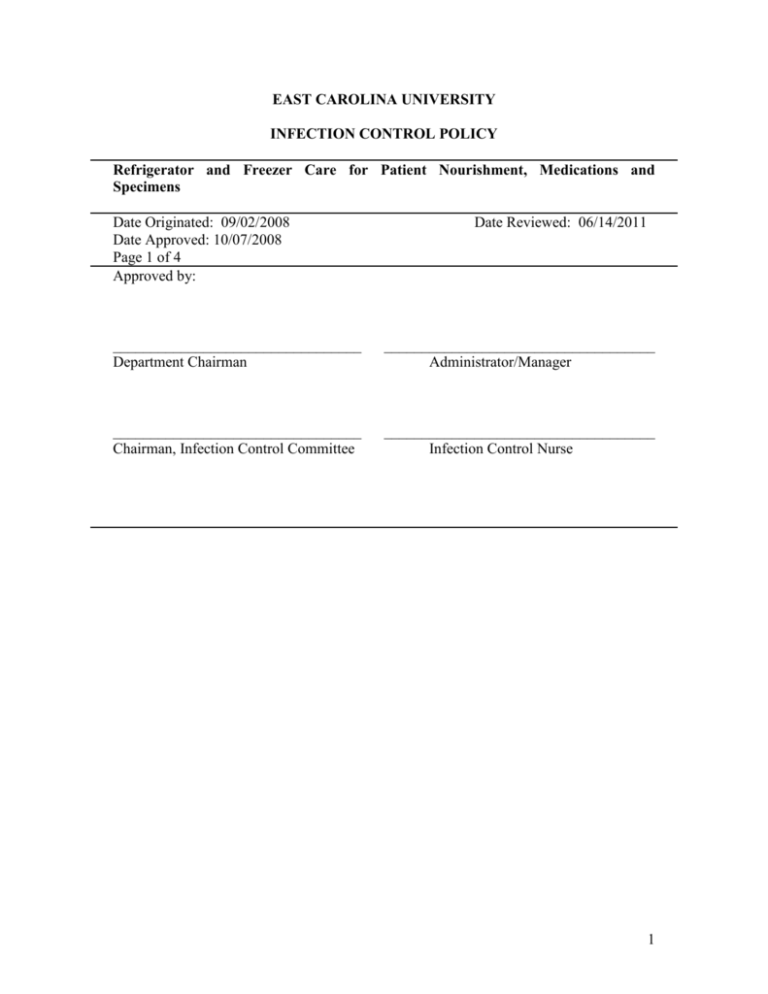
EAST CAROLINA UNIVERSITY INFECTION CONTROL POLICY Refrigerator and Freezer Care for Patient Nourishment, Medications and Specimens Date Originated: 09/02/2008 Date Approved: 10/07/2008 Page 1 of 4 Approved by: Date Reviewed: 06/14/2011 _________________________________ Department Chairman ____________________________________ Administrator/Manager _________________________________ Chairman, Infection Control Committee ____________________________________ Infection Control Nurse 1 Care of Refrigerators and Freezers in Patient Care Areas I. II. Purpose: To provide safe storage of drugs, food and specimens. Inadequate refrigeration of foods may permit growth of microbes, resulting in a greater likelihood of food-borne illness. Inadequate refrigeration of medications, biologics, vaccines, and blood and blood products may alter potency and/or chemical composition or allow proliferation of microbial contaminants. Condensate pans for refrigerators and/or freezers used to store food, pharmaceutical, and blood products can create conditions for mold growth. Procedures: A. Cleaning 1. All refrigerators/freezers should be cleaned with an EPA approved disinfectant weekly and as necessary for spills. 2. Spills should be cleaned as they occur. 3. Any expired food or drink will be discarded 4. Expired medications will be discarded B. Contents 1. Refrigerators must be labeled to note whether they are FOOD ONLY, MEDICATION ONLY OR SPECIMENS ONLY. 2. All food in patient nutrition refrigerators must be dated when opened discarded according to (1) the manufacturer’s recommendation or (2) Odor, color change, texture change, or visible contamination or the food or beverage. 3. All items in patient nutrition refrigerators must be in a covered container or appropriately wrapped. 4. Medication or drug refrigerators should be kept solely for the purpose of storing medicines that require refrigeration according to manufacturer’s instructions. 5. Specimen refrigerators should contain only specimens that are properly secured and appropriately labeled. 6. A biohazard label should be placed on specimen refrigerators. C. Temperature monitoring 1. An accurately calibrated thermometer should be kept in each refrigerator and freezer at all times. Type of Refrigerator Nutrition Medication Freezers Pathology specimens Temperature Requirements 1˚-5˚C ( 34˚-41˚F) 2˚-8˚C (36˚-46˚F) ˉ20˚-ˉ10˚C (ˉ4-14˚F) 2˚-8˚C (36˚-46˚F) 2 2. The temperatures of any refrigerator containing drugs, patient nutrition or specimens should be checked and logged daily to ensure proper temperature control. (See Appendix A) 3. Temperatures that register above or below the appropriate range will be rechecked after door has remained closed for 1 hour. Temperatures not within the acceptable range at 1 hour will be reported to facilities. 4. If the refrigerator is unable to be repaired immediately, it will be taken out of service and contents removed and placed in another refrigerator. 5. In order to monitor for mechanical failure or electrical outages that may occur overnight, or on weekends and holidays, place a penny on top of a small cup of ice and keep the cup it in the freezer. If there has been a disruption of power, the ice will have melted and the penny will no longer be on top of the ice. Discard food items and notify pharmacy for medication refrigerators and the Lab regarding any specimens. 6. All actions taken must be recorded on the temperature log. 7. Temperature logs should be saved for 1 year. 3 Appendix A Refrigerator/Freezer Monitoring Log Type of Refrigerator Nutrition Medication Freezers Pathology specimens Temperature Requirements 1˚-5˚C ( 34˚-41˚F) 2˚-8˚C (36˚-46˚F) ˉ20˚-ˉ10˚C (ˉ4-14˚F) 2˚-8˚C (36˚-46˚F) Month__________________ Day Temp Initials Weekly Cleaning 1 2 3 4 5 6 7 8 9 10 11 12 13 14 15 16 17 18 19 20 21 22 23 24 25 26 27 28 29 30 31 Year___________________ Problems Facilities Notified Action taken 4
